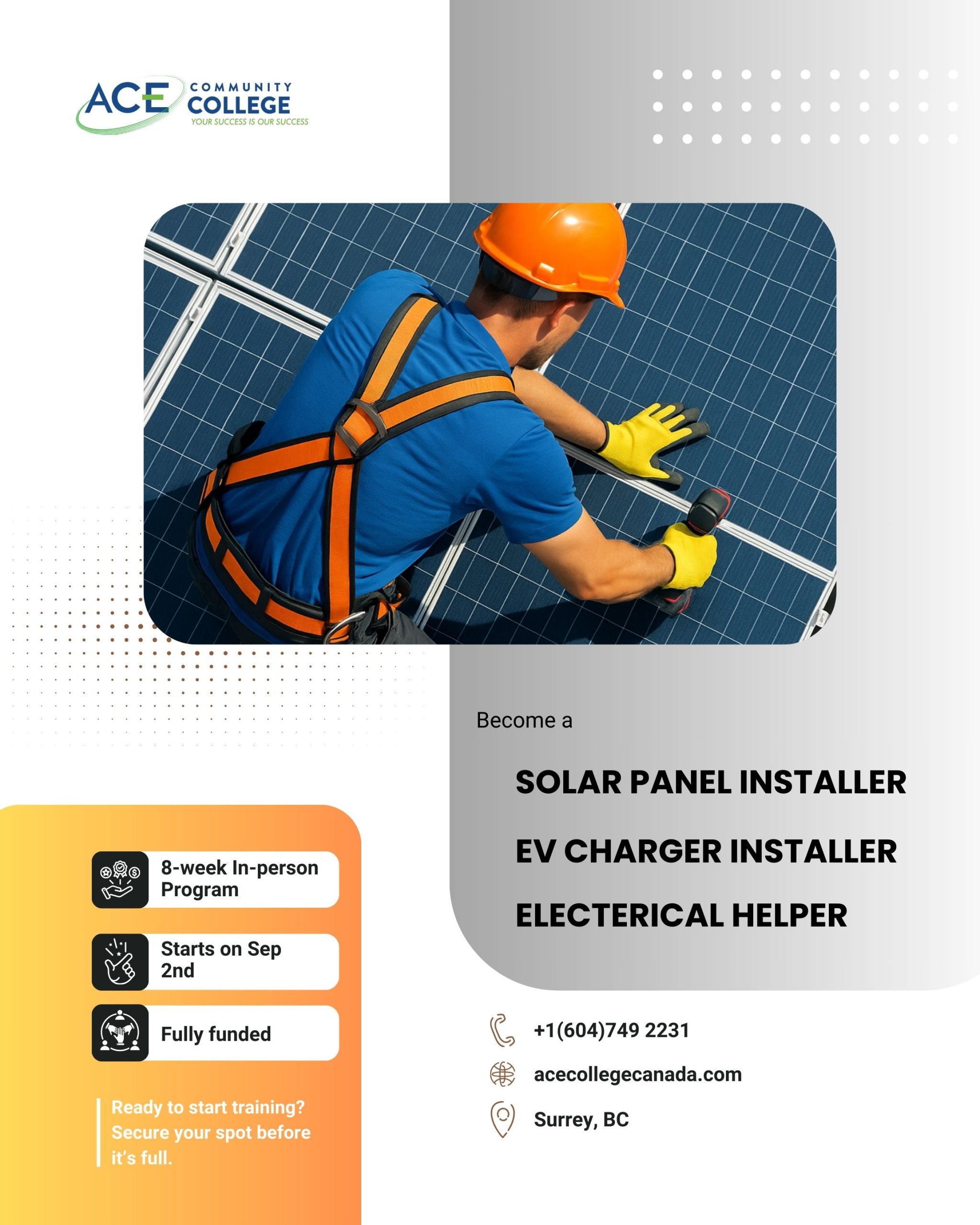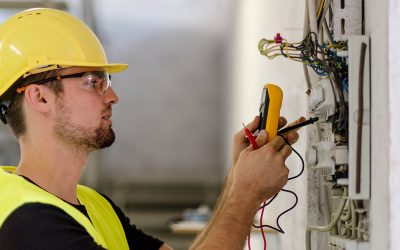Green Energy Installer Training (epp)
This Program Does Not Require Approval by the Private Training Institutions Regulatory Unit (PTIRU)
Green Energy Installer Training (EPP)
The Green Energy Installer Training (EPP) program is developed in consultation with industry experts and is geared to youth and adults who have an interest in working in the renewable energy industry. The future of BC’s energy looks bright, with clean energy job growth projected to outpace losses in fossil fuels amid a shifting global landscape. Students will be prepared for entry-level jobs in green energy equipment installation and service, where demand is high and earning potential is good. Renewable Energy employers will gain a highly trained and experienced workforce that supports in strengthening British Columbia’s economy.
The clean energy sector’s GDP is forecast to grow an impressive 58% by 2030. By 2030, clean energy will make up 29% of Canada’s total energy GDP, which means between 2021 and 2030, there will be close to 50 gigawatts of wind and solar projects to be installed or to begin construction. Wind and solar energy have contributed more to Canada’s installed electricity-generating capacity than any other technologies over the last decade. Already, Canada’s clean energy sector employs 430,500 people, more than the entire real estate sector, and by 2030, that number is projected to grow almost 50% to 639,200.
B.C. is home to two hydrogen fuel cell manufacturers, Loop Energy and Ballard Power, both of which are seeing international demand for their technology. Employers must find creative solutions, including hiring entry-level employees and helping them to develop the skills required on the job.
By 2030, there will be 26 times more jobs in electric vehicle technology than there were in 2020. Canada’s auto sector is starting to shift in an electric direction. General Motors, Ford, and Stellantis (formerly Fiat Chrysler) have announced major electric vehicle assembly investments in Canada over the past year. But with more EV models on the horizon, Canada must take action to expand its EV manufacturing capabilities.
Successful graduates of this program may also explore opportunities to pursue further development in becoming a renewable energy technician or other related areas in the renewable energy sector. The most essential ingredient is a trained workforce that can perform the tasks necessary to install, commission, repair, and maintain the particular equipment associated with the technology involved. This program appeals to learners who enjoy change and adapting to new technology and want to seize the opportunity to take positive action to ensure an improved future environment.
This program emphasizes hands-on, practical training, using equipment typically encountered in the renewable energy industry in the ACE Community College 3200 square feet workshop, totally focused on industry practice.
The necessary theoretical work component is integrated into the program to complement and enhance the practical. Industry tours will expose the student to a variety of work environments.
After completing a mathematics review, students will attend WorkSafe BC and workplace safety training, followed by WorkSafe BC’s Occupational Safety Officer’s presentation and discussion. Students will learn the basics of the Canadian electrical code (with regards to renewable energy); read and interpret drawings; basic electrical principles; and Apply the Canadian Electrical Code to renewable energy system installations. How to install a battery bank that powers up a wind generator via a charge controller. Understand basic functions of hand tools and power tools and how to operate them; how a basic hydraulic braking system circuit works; storing energy and retrieving the stored energy for use when required, electrical code requirements for stored energy systems, production of electrical energy by fuel cells, and monitoring of fuel cell and energy storage systems; understanding how a basic Solar Photo-voltaic module works; Apply solar photovoltaic systems safety principles and practices including controlling for identified risks; key points to know regarding solar photovoltaic pre-installation/ on-site implementation strategy; domestic electrics and EV car charging point installation.
Practical application of theory is demonstrated in the shop of our campus. Contained within the program is training towards certification for WHMIS, confined spaces and ladder safety training.
Career Occupation
Graduates will be able to work in entry-level positions as installers for various residential/commercial renewable energy projects, including Solar Panels, wind energy, electric car charging stations etc. They will have essential safety certifications and skills training to start their career in the green energy sector as installers that will allow them to contribute to various projects.
Admission Requirements
Prior to acceptance, applicants must successfully complete the admissions interview and meet each of the following requirements listed under items 1) and 2) below.
1) Fulfill Math Assessment Requirement
Math Assessment requirement
a) Successful completion of a math assessment conducted in-house by Ace Community College with a minimum score of 50%
OR
b) Successful completion of provincially recognized Grade 10, 11, or 12 Mathematics with a minimum passing score of C.
2) Fulfill Language Proficiency Requirement
Language Proficiency Requirement
All applicants must meet at least one of the following criteria (a, b, c, or d)
- a) Evidence that 3 years of full-time secondary education (Grades 8-12), or 2 years if the Grades are 10, 11, or 12, have been completed in the program’s language of instruction in a country where the language of instruction is one of the principal languages*.
*Applicants are advised to contact ACE Community College to confirm whether their country is officially recognized as one where English is the principal language of instruction for the purpose of meeting this requirement.
- b) 2 years of full-time post-secondary education* have been completed in the program’s language of instruction in a country where the language of instruction is one of the principal languages (includes international education credentials recognized through WES, ICES, and IQAS).
*Language development courses (i.e., ELL courses) cannot be included in this calculation.
- c) Provide official, verified transcripts showing results for one of the English language proficiency tests listed below, with scores that meet or exceed the minimum requirements specified for each test.
Test results must be dated no more than two years before the start date of the program:
- International English Language Testing System:(IELTS) Academic Minimum overall score of 5.5
- Test of English as a Foreign Language (TOEFL) IBT: Minimum overall score of 46
- Canadian Academic English Language Assessment (CAEL): Minimum overall score of 40
- Canadian English Language Proficiency Index Program (CELPIP): Listening 6, Speaking 6, Reading 5, and Writing 5.
- Duolingo English Test (DET): Minimum overall score of 95
- Pearson Test of English (PTE) Academic: Minimum overall score of 43
- Cambridge English Qualifications: B2 First exam (FCE)
- Institutions may include other Cambridge Qualifications at a higher level (i.e., C2 Proficiency (CPE)): Minimum overall score of 160 or “C”
- Cambridge Linguaskill: Minimum overall B2 level
- LANGUAGECERT Academic: Minimum overall B2 level
- The Michigan English Test (MET): Minimum overall B2 level
- iTEP Academic: Minimum overall score of 3.5
- EIKEN: Minimum placement of Grade Pre-1
- d) Mature student applicants ONLY:
Applicant is 19 years or older at the start of the program and is a Canadian citizen or permanent resident who cannot access their educational records or provide sufficient evidence of secondary or post-secondary education as outlined above:
- I. Applicant must provide attestation that they have completed at least three years of full-time instruction in English in a country where English is one of the principal languages.
- II. Applicant completes an Accuplacer English Assessment (Next Generation: Reading, Writing, and WritePlacer) and achieves the following minimum scores:
- ✓ Reading: 230
- ✓ Writing: 230
- ✓ WritePlacer: 4
Learning Objectives
Upon completion of this program, students will be able to:
- Support in the application of solar photovoltaic systems safety principles and practices, including controlling for identified risks.
- Supporting crew involved in the development of solar photovoltaic pre-installation on-site implementation strategy.
- Assist in the installation, troubleshooting, and maintenance of solar photovoltaic systems.
- Support in the Installation of geothermal and solar thermal heating systems in conformance with the Canadian Electrical Code.
- Assist in testing RTD and thermocouple sensors.
- Assist in the Installation and connection of batteries, battery charging systems, including inverters and fuel cells.
- Apply safe work practices in renewable energy storage, production, and retrieval systems.
- Will be able to support during the installation of a domestic EV car charging point.
Method(s) of Evaluation
- Weekly on-campus tests will be conducted.
- In the end, students will be given a final exam.
Completion Requirements
- Successful completion of all on-campus tests with a minimum of 50% overall average.
- Successfully passing the final exam with a minimum of 50% overall average.
- Successful completion of Confined spaces, ladder safety, and WHMIS training, which will be completed during the program.
Program Duration
- The total program hours are 240.
- The full-time program length is 8 weeks.
Homework Hours
Students can expect to complete 1 to 3 hours of homework per day.
Delivery Method(s)
The program is offered through in-class instruction as well as a combined delivery format that includes both in-class and distance learning.
Required Course Materials
Green Energy Installer Training E-book.
- a. AUTHOR: ACE Community College
- b. PUBLISHER: ACE Community College
Program Organization
| Title of Course/Work Experience Component | # of Hours |
|---|---|
| Green Energy Installer Training | 240 |
Domestic Students
Tuition: $7,500
Application Fee: $250
Administration Fee (includes Student Record Management): $300
Text Books: $200
Course Materials (includes access to the Learning Management System – LMS): $350

LATEST NEWS
Electrical Foundation Harmonized Program for construction electrician careers
Electrical Foundation Harmonized Program for Construction Electrician CareersLooking to start trades training for an apprenticeship or career in the construction industry? Have your plans been impacted by COVID-19? Join this 20-week Skilled...
Skilled Trades Certification
Skilled Trades Certification SkilledTrades BC Supporting The Transition To Skilled Trades Certification (STC) Background British Columbia has a strong and effective trades training system that offers multiple pathways for apprentices to achieve...
Information Session
Join us for an informative session to gain an in-depth understanding of our diverse programs and the unique opportunities available at our institution. Meet our experienced faculty and get insights into the curriculum and teaching methods. Learn...





